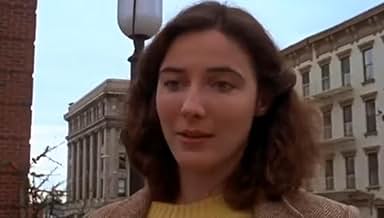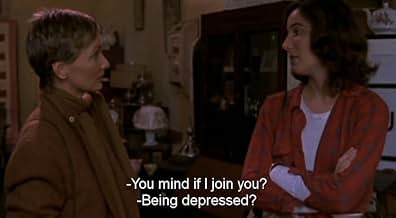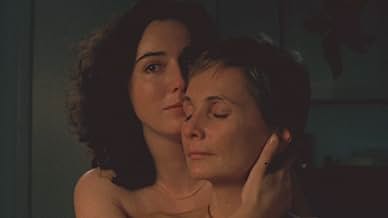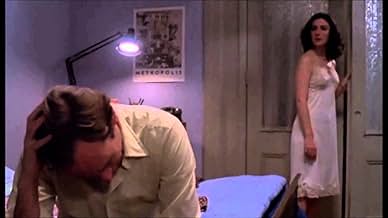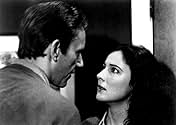IMDb RATING
6.9/10
1.9K
YOUR RATING
A happily married woman comes to realize herself of being a repressed lesbian after she has an affair with a female college professor, and then tries to come to terms with her newfound lifes... Read allA happily married woman comes to realize herself of being a repressed lesbian after she has an affair with a female college professor, and then tries to come to terms with her newfound lifestyle.A happily married woman comes to realize herself of being a repressed lesbian after she has an affair with a female college professor, and then tries to come to terms with her newfound lifestyle.
Jessica MacDonald
- Theda
- (as Jessica Wight MacDonald)
- Director
- Writer
- All cast & crew
- Production, box office & more at IMDbPro
Featured reviews
Linda Griffiths ('Overdrawn at the Memory Bank') plays the title character, a wife & mom unhappily married to unfaithful film professor Dick (Jon DeVries, "American Gangster"). She's long suppressed what turn out to be lesbian tendencies, only fully accepting this once she embarks upon a relationship with Ruth (Jane Hallaren, "Body Heat"), her child psychology professor. Naturally, this causes various problems in her formerly staid existence.
Writer / director / editor and indie favorite John Sayles was ahead of the curve here in his effort to tell a mature story of a lesbian romance, and his script is notably intelligent and compassionate. As always, he has a great ear for dialogue, and there are some very funny lines along the way. (Per his style, he gives himself an amusing supporting role as the character Jerry.) Moreover, the whole story is *believable*, and the characters come off as real, multi-dimensional people.
This little film is well cast right down the line, even if much of the cast are not exactly big names. Griffiths & Hallaren are wonderful in the leads, and Jo Henderson ('Search for Tomorrow') is likewise engaging as Liannas' good friend Sandy, who admits to being uncomfortable about Liannas' coming out, but who still intends to be the best friend that she can be. A young Chris Elliott ('Get a Life') made his film debut here, in a small role as a lighting technician.
Ultimately a sensitive tale of one womans' journey towards self-discovery, "Lianna" is one of those pictures that discerning viewers can't afford to miss.
Eight out of 10.
Writer / director / editor and indie favorite John Sayles was ahead of the curve here in his effort to tell a mature story of a lesbian romance, and his script is notably intelligent and compassionate. As always, he has a great ear for dialogue, and there are some very funny lines along the way. (Per his style, he gives himself an amusing supporting role as the character Jerry.) Moreover, the whole story is *believable*, and the characters come off as real, multi-dimensional people.
This little film is well cast right down the line, even if much of the cast are not exactly big names. Griffiths & Hallaren are wonderful in the leads, and Jo Henderson ('Search for Tomorrow') is likewise engaging as Liannas' good friend Sandy, who admits to being uncomfortable about Liannas' coming out, but who still intends to be the best friend that she can be. A young Chris Elliott ('Get a Life') made his film debut here, in a small role as a lighting technician.
Ultimately a sensitive tale of one womans' journey towards self-discovery, "Lianna" is one of those pictures that discerning viewers can't afford to miss.
Eight out of 10.
10zetes
Sayles' second feature as director, and his first great film. It's not perfect, has its share of clichés and is certainly dated, but it's wonderful. Linda Griffiths stars as Lianna, a young mother of two who is constantly suffering under her smarter, controlling husband, a film professor (Jon DeVries). Lianna doesn't have much of a life, but she manages to sneak in a night class twice a week. She develops what seems to be a non-romantic crush on her professor (Jane Hallaren). When her husband cheats on her, the relationship with her professor changes to a sexual one. It would be easy to hold the fact that Sayles is a man against the movie. However, Sayles does here what he does best: create strong, identifiable characters for whom we care. Lianna is really one of the best developed characters I can remember. I absolutely love the way Sayles makes her intellectually inferior to both her husband and lover. It gives her struggle a lot of weight. And I love the line she says to her husband: "Just because you can argue better doesn't mean you are right." She breaks my heart. The power structure between her and her husband is brilliantly written. I also liked that Sayles creates a new power structure, and not one wholly different from the marriage, between Lianna and her lesbian lover. My only complaint is that Sayles does sometimes treat Hallaren's character too kindly. She's clearly taking advantage of Lianna, and at times she's clearly treating her badly. In fact, the relationship starts exactly the same way as the relationship between Lianna and her husband. She was once his student, as well. The parallel isn't underlined as well as it should have been. I think Linda Griffith's performance here is one of the best ever. It's a tragedy that she didn't become famous after this. I know that Sayles isn't the greatest director (specifically referring to the direction) in the world, but this is some of his best work on that front (his very best is certainly Matewan). Of course his greatest talent is his writing; he is such a remarkable writer of human interrelationships. Sayles also gives his best performance as an actor in this film. Lianna is such a subtle work of human emotion. It really doesn't have any big moments, and it doesn't end with any clear resolution. The film's power only hit me about 20 minutes after it was over. It's a small masterpiece.
A woman develops romantic feelings for her (female) child psychology professor. A love affair ensues, and Lianna's life is transformed.
John Sayles' film is an attractive, well-made piece, perceptively analysing character and relationships in the claustrophobic atmosphere of a small-town college campus. The location looks like upstate New York (Sayles is a native of Schenectady).
Lianna Massey is in her 30's and she has allowed life to happen to her. As a college student she drifted into a relationship with her teacher, Dick. Now she is married to him and they have two children. We see her doing the dull rounds, picking up the kids and waiting at the back of Dick's class to give him a ride home. Alone after the students leave, Lianna and Dick do not embrace. This is a loveless marriage. When Dick complains about Lianna entering his class, she hits back with, "Afraid you'll let them see you playing husband?" We now have Dick's measure. He is a philanderer who preys on undergraduates for sex.
Dick has exploited Lianna's passivity, shaping the marriage to his own advantage. Even the children are named after his favourite movie stars (Dick lectures in Film Studies). He attends campus parties alone, reasoning that he has to be seen at these functions if he is to get tenure. In fact, he is busy chasing student skirt. When Lianna shows up at one party unannounced and sees him romping in the sand box, her last bond of loyalty towards him is severed.
Ruth Brennan is an impressive woman. In her late 40's and a professor of Child Psychology, she is bright, good-looking and stylish, with plenty of wisdom and poise. She teaches an evening class for campus moms, and this is where Lianna meets her. Drawn to the urbane, understanding Ruth, Lianna makes clumsy attempts to ingratiate herself, offering to work as a research assistant and compiling lists of children's literature. While Dick is out of town attending the Toronto Film Festival, Lianna takes the opportunity to have dinner at Ruth's place.
Ruth is an experienced lesbian, but Lianna is not yet even aware that this is where the friendship is heading. As she prepares for the dinner date, we see Lianna decide, on a whim, to go bra-less. Her feelings are as yet inchoate, but we know that the relationship is about to become sexual.
The two women become lovers, but things do not work out as cosily as the naive Lianna had expected. She burns her boats with Dick, who shows that his hard intellect is coupled with a phenomenal mean streak. Lianna's friend Sandy, uncomprehendingly conventional in her outlook, rejects her. Even more ominously, Ruth proves to be an aloof, calculating lover. Lianna is dismayed to find that she can't move in with Ruth, because it would cause a scandal "here in faculty land". Suddenly Lianna is confronted with the stark reality of her new situation: her children stay with Dick while she has to find herself a job and a place to live. Ruth ends the research assistant arrangement, saying that it is inappropriate for a bed partner to be an employee. She asks Lianna not to call her by her first name in class. Worse still, Lianna learns of "the woman back home", Ruth's long-standing lover, who is still very much on the scene.
As the affair with Ruth fades and withers, Lianna has to feel her way painfully towards a new life for herself. We see her alone in her empty apartment, the plaintive whistle of the kettle representing the dull ache of her unhappiness. She has to cope with a dead-end job and brainless colleagues, having forsaken the easy life of a faculty mom and the sparkling wit of campus society. Her TV set becomes her life, the lame soap opera dialogue echoing her words to Ruth. The girl in the launderette is reading "The Well Of Loneliness". Lianna's meetings with her children are agonising for all concerned. Jerry the campus stud (played by Sayles) calls on the company-starved Lianna. She is delighted to see him until she realises that he is a shark, trying to exploit her vulnerability. When he is rebuffed, Jerry (typically) misses the point and rationalises it in self-referential terms: "My technique must be getting ragged."
Early on in the affair, Ruth had taken Lianna to a gay bar. The 'naughtiness' and the excitement of it had been a liberating experience for the Alberta girl. Now, she heads back to the bar merely to slough off her loneliness. When she ends up in bed with Cindy of the Women's Air Corps, Cindy points out that the two of them have little in common. "We have enough," replies Lianna bleakly.
There are plenty of strikingly clever moments in this impressive film. Sayles' crash-edited blackboard trick is memorable. Later, students try to film a drinks party, and Sayles comments ironically on their attempt by shooting the scene with a handheld camera. The dance show which Lianna stage-manages is a neat dramatisation of her predicament, and the beautiful Otis Redding music entirely apposite. The children are shown brilliantly to be 'in the middle' of the marriage breakdown as they sit on the sofa, eyes darting back and forth between mom and dad, like tennis spectators.
The telephone is used cleverly to symbolise communication breakdown. Dick slams the receiver down, signifying the death of the marriage, and Lianna fails to get any answers as she phones out from her beleaguered apartment.
John Sayles' film is an attractive, well-made piece, perceptively analysing character and relationships in the claustrophobic atmosphere of a small-town college campus. The location looks like upstate New York (Sayles is a native of Schenectady).
Lianna Massey is in her 30's and she has allowed life to happen to her. As a college student she drifted into a relationship with her teacher, Dick. Now she is married to him and they have two children. We see her doing the dull rounds, picking up the kids and waiting at the back of Dick's class to give him a ride home. Alone after the students leave, Lianna and Dick do not embrace. This is a loveless marriage. When Dick complains about Lianna entering his class, she hits back with, "Afraid you'll let them see you playing husband?" We now have Dick's measure. He is a philanderer who preys on undergraduates for sex.
Dick has exploited Lianna's passivity, shaping the marriage to his own advantage. Even the children are named after his favourite movie stars (Dick lectures in Film Studies). He attends campus parties alone, reasoning that he has to be seen at these functions if he is to get tenure. In fact, he is busy chasing student skirt. When Lianna shows up at one party unannounced and sees him romping in the sand box, her last bond of loyalty towards him is severed.
Ruth Brennan is an impressive woman. In her late 40's and a professor of Child Psychology, she is bright, good-looking and stylish, with plenty of wisdom and poise. She teaches an evening class for campus moms, and this is where Lianna meets her. Drawn to the urbane, understanding Ruth, Lianna makes clumsy attempts to ingratiate herself, offering to work as a research assistant and compiling lists of children's literature. While Dick is out of town attending the Toronto Film Festival, Lianna takes the opportunity to have dinner at Ruth's place.
Ruth is an experienced lesbian, but Lianna is not yet even aware that this is where the friendship is heading. As she prepares for the dinner date, we see Lianna decide, on a whim, to go bra-less. Her feelings are as yet inchoate, but we know that the relationship is about to become sexual.
The two women become lovers, but things do not work out as cosily as the naive Lianna had expected. She burns her boats with Dick, who shows that his hard intellect is coupled with a phenomenal mean streak. Lianna's friend Sandy, uncomprehendingly conventional in her outlook, rejects her. Even more ominously, Ruth proves to be an aloof, calculating lover. Lianna is dismayed to find that she can't move in with Ruth, because it would cause a scandal "here in faculty land". Suddenly Lianna is confronted with the stark reality of her new situation: her children stay with Dick while she has to find herself a job and a place to live. Ruth ends the research assistant arrangement, saying that it is inappropriate for a bed partner to be an employee. She asks Lianna not to call her by her first name in class. Worse still, Lianna learns of "the woman back home", Ruth's long-standing lover, who is still very much on the scene.
As the affair with Ruth fades and withers, Lianna has to feel her way painfully towards a new life for herself. We see her alone in her empty apartment, the plaintive whistle of the kettle representing the dull ache of her unhappiness. She has to cope with a dead-end job and brainless colleagues, having forsaken the easy life of a faculty mom and the sparkling wit of campus society. Her TV set becomes her life, the lame soap opera dialogue echoing her words to Ruth. The girl in the launderette is reading "The Well Of Loneliness". Lianna's meetings with her children are agonising for all concerned. Jerry the campus stud (played by Sayles) calls on the company-starved Lianna. She is delighted to see him until she realises that he is a shark, trying to exploit her vulnerability. When he is rebuffed, Jerry (typically) misses the point and rationalises it in self-referential terms: "My technique must be getting ragged."
Early on in the affair, Ruth had taken Lianna to a gay bar. The 'naughtiness' and the excitement of it had been a liberating experience for the Alberta girl. Now, she heads back to the bar merely to slough off her loneliness. When she ends up in bed with Cindy of the Women's Air Corps, Cindy points out that the two of them have little in common. "We have enough," replies Lianna bleakly.
There are plenty of strikingly clever moments in this impressive film. Sayles' crash-edited blackboard trick is memorable. Later, students try to film a drinks party, and Sayles comments ironically on their attempt by shooting the scene with a handheld camera. The dance show which Lianna stage-manages is a neat dramatisation of her predicament, and the beautiful Otis Redding music entirely apposite. The children are shown brilliantly to be 'in the middle' of the marriage breakdown as they sit on the sofa, eyes darting back and forth between mom and dad, like tennis spectators.
The telephone is used cleverly to symbolise communication breakdown. Dick slams the receiver down, signifying the death of the marriage, and Lianna fails to get any answers as she phones out from her beleaguered apartment.
When John Sayles makes a film, it's usually because he has a very good reason. A man who's made his life in film averting the Hollywood approach, Sayles stories are densely layered character dramas, unencumbered with camera tricks, special effects, or deception.
The idea that Lianna (Linda Griffiths) needs a change of life in and of itself is not surprising. As a young college student, she had succumbed to the advances of one of her professors, then quit school to marry him. Now, twelve years and two children later she finds her life mundane, and loveless. She needs a change.
A John Sayles film is a personal experience. He leads us down a road deluged with emotion, conflict and only some spattering of resolve. The rest he leaves for us. Sometimes we have to fill in the blanks to even the most difficult questions posed. And there's nothing wrong with that.
The idea that Lianna (Linda Griffiths) needs a change of life in and of itself is not surprising. As a young college student, she had succumbed to the advances of one of her professors, then quit school to marry him. Now, twelve years and two children later she finds her life mundane, and loveless. She needs a change.
A John Sayles film is a personal experience. He leads us down a road deluged with emotion, conflict and only some spattering of resolve. The rest he leaves for us. Sometimes we have to fill in the blanks to even the most difficult questions posed. And there's nothing wrong with that.
I think if you are interested in the subject matter, the content of the movie carries it. The comments thus far have been extremely positive, which is not quite in line with the current rating. So my comment would be to warn you that there is a lot of mediocre acting and the photography was not great. I'm sure the budget of the movie had a lot to do with it. And in some way the lack of great lighting, etc., and the "lameness" of the movie tends to work in its favor to present the subject matter as very ordinary, very commonplace, in opposition to how society wants to view this as something very unusual. I'm not a long-winded person. The need to pad this out to meet an IMDB requirement of ten lines would seem to ensure that there will be a lot of filler in these comments.
Did you know
- TriviaJohn Sayles had written the screenplay for this film before writing the screenplay for his debut film, Return of the Secaucus Seven (1980). Sayles failed to get funding for a film about a lesbian love affair in the 1970s, and those who felt comfortable with the material were not comfortable with the film being directed by a man. So, Sayles put the Lianna (1983) screenplay on hold until gaining success with his two first films, Return of the Secaucus Seven (1980) and Hello baby (1983).
- Crazy creditsThe opening credits credit only the production company and the crew members. The cast is not credited until the end credits. The title of the film, LIANNA, appears as the last title card after John Sayles is credited as writer, producer, director and editor.
- ConnectionsFeatured in Celluloid Closet (1995)
- How long is Lianna?Powered by Alexa
Details
Box office
- Budget
- $300,000 (estimated)
- Gross US & Canada
- $1,530,839
- Gross worldwide
- $1,530,839
Contribute to this page
Suggest an edit or add missing content



